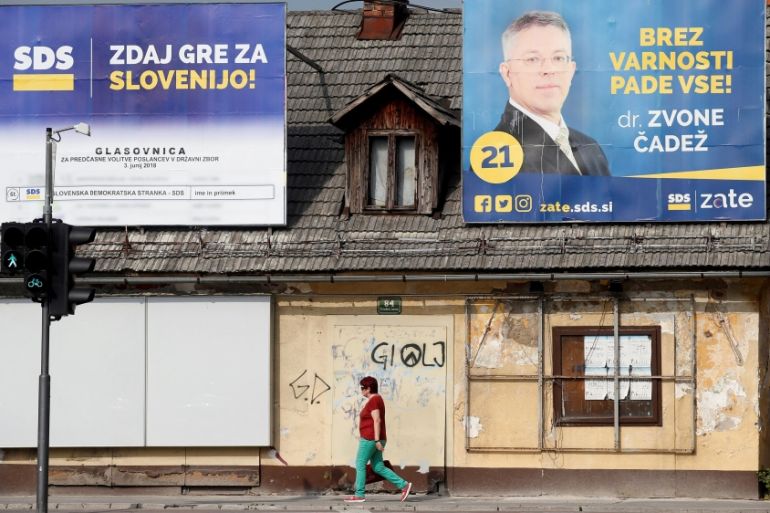Slovenia: Anti-migrant party gains highlight ‘Orban’s soft power’
Although the anti-migrant SDS may struggle to form a coalition, analysts say the vote highlights rising populism.

With a right-wing, anti-migrant party pulling in the largest number of votes in Slovenia’s elections, observers are debating where the country fits in the so-called populist wave in Europe.
On Sunday, the Slovenia Democratic Party (SDS) clinched 25 percent of the national vote.
Keep reading
list of 4 itemsBeyond borders: Migrants online
Tunis police raid sees refugees abandoned near the border with Algeria
‘No turning back’: Carnation Revolution divides Portugal again, 50 years on
Although it remains unclear if SDS will be able to form a coalition, the party’s campaign tactics and rhetoric have aroused concern among analysts who track the ongoing developments around right-wing and far-right populist parties in Europe.
The List of Marjan Sarec (LMS), an anti-establishment party, came in second with just under 13 percent of the vote.
Meanwhile, the centre-left Social Democrats earned 10 percent, the centrist Moderate Centre Party 9.75 percent and the left-wing Levica party nine percent.
With a population of more than two million, Slovenia gained its independence from the Socialist Federal Republic of Yugoslavia in 1991 and was recognised by the European Union the following year.
Despite gaining the largest number of votes, a broader coalition of centrist and left-leaning parties could potentially exclude the SDS.
Far-right Hungarian leader Viktor Orban, who recently won re-election after campaigning on an intensely anti-refugee and anti-Muslim platform, is a vocal backer of the SDS and its leader, former Prime Minister Janez Jansa.
SDS topped the vote at a time when Europe is still reeling from staunchly anti-migrant parties making significant gains in Austria, Italy and elsewhere.
Peter Kreko, executive director of Political Capital: Policy Research and Consulting Institute, described the results as “part of the populist zeitgeist”.
Speaking to Al Jazeera, Kreko argued the SDS’s electoral campaign was indicative of “Orban’s soft power” in Central Europe and the Balkans.
Growing influence of Hungary’s Orban?
While stressing that Slovenia’s SDS garnered far less support than Orban’s ultra-nationalist Fidesz party in Hungary’s elections, Kreko said “fear mongering over immigration” and “xenophobia” are qualities both share.
“The experience of other European countries is that, when a populist party brings this type of message, it has an impact on the broader political spectrum,” he said.
Like many analysts, Kreko said Orban’s open endorsement of the 59-year-old Jansa and his party were part of a broader transnational process of the Hungarian leader spreading his influence throughout the region.
Orban has nurtured ties with Serbia’s ruling party, Prime Minister Aleksandar Vucic’s Serbia Progressive Party, as well as anti-liberal outfits in Croatia, Macedonia and Poland, among others.
Those efforts have been accompanied by a campaign orchestrated by pro-Orban media to buy up news outlets in Macedonia and push for greater influence in the Balkans, as recently reported by the Organised Crime and Corruption Reporting Project (OCCRP).
‘Slovenians first’
Jansa, who served as Slovenia’s prime minister from 2004 to 2008 and again from February 2012 to March 2013, declared his party’s intentions to put “Slovenians first” after the preliminary results were announced.
Throughout the campaigning period, Jansa honed in on refugees and migrants, and on Sunday evening he reiterated his rhetoric by proclaiming that migration was “the most serious challenge” for the majority of Europeans.
The tunnel-vision focus on refugees and migrants “is something that resonates even in countries where there are practically no immigrants”, according to Kreko.
“It is xenophobia without the presence of immigrants, and this is partially the case in Slovenia as well,” he added.
More than half a million refugees and migrants passed through Slovenia in 2015 and 2016, although the overwhelming majority continued their journeys to elsewhere in Europe.
In March 2016, Slovenia joined several other countries in central Europe and the Balkans when it sealed its borders to asylum seekers fleeing war and economic devastation.
Noting that it would be an immense struggle for the SDS to form a coalition, Mojca Pajnik, a research councilor at the Ljubljana-based Peace Institute, argued the party has been “developing clear features of extremist right-wing populism” in recent years.
As part of the right-wing European People’s Party alliance in the European Parliament, the SDS is aligned with the ruling Austria People’s Party, Greece’s right-wing New Democracy and Poland’s conservative Civic Platform, among others.
‘Literally copied Orban’s campaign’
In the past, SDS has been criticised for its alleged ties with the anti-Muslim, far-right Identitarian movement and other right-wing youth movements.
“They’ve been radicalising in the sense of moving toward more and more elements of autocracy and a more totalitarian way of understanding politics,” Pajnik told Al Jazeera.
“In the last decade, these feelings have been strengthened.”
According to Pajnik, the SDS “literally copied Orban’s campaign” by employing “racialised rhetoric” in the latest elections.
“Slovenia was flooded with hostile billboards across the country in [recent] months… Some were attacking NGOs that work on human rights issues. The notion of security of the natives against the insecurity [posed] by migrants was put into focus.”
In May, Orban chimed in when he stated “the survival of the Slovenian people” could only be guaranteed by the SDS winning.
Hurdles remain for the SDS and the only party that has expressed willingness to negotiate a coalition with Jansa is New Slovenia, a conservative Christian party that clenched seven percent of the vote on Sunday.
“The good news, speaking from the perspective of human rights, is that many people voted for the left and centre-left,” Pajnik continued.
“This also means they said ‘no’ to the Orbanisation of politics in Slovenia.”